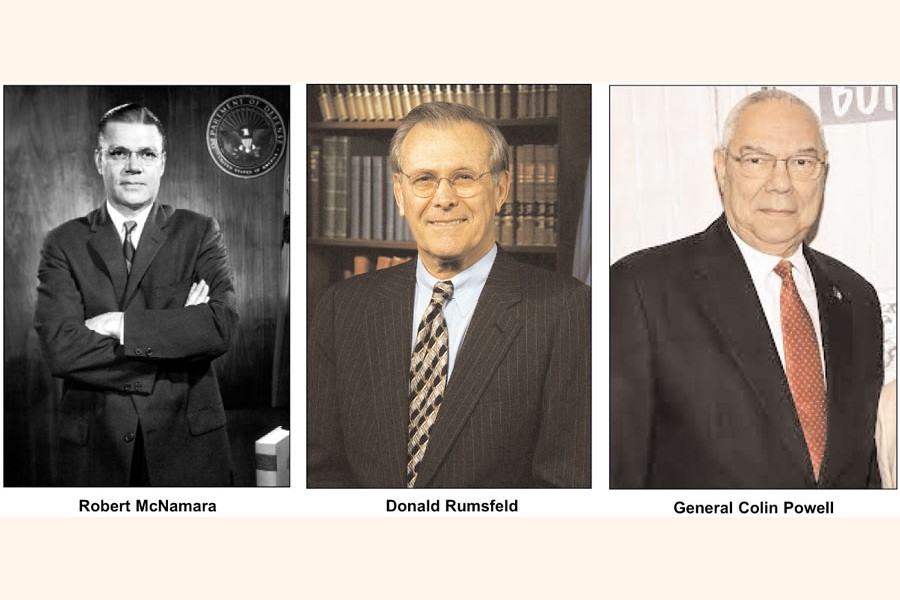General Colin Powell's death from Covid-related complications at the age of eighty-four is reason once again for one to go back to recent history. There is little question that Powell was an important establishment figure in the United States, having served as chairman of the joint chiefs of staff. Prior to that, he had two tours of duty in Vietnam. After his retirement from the army, he took upon himself the role of secretary of state in the administration of President George W. Bush. And it was in this role that his contribution became mired in controversy, for reasons that had to do with how he played that role. In the build-up to the war in Iraq in early 2003, a conflict based on false assumptions about Saddam Hussein's military hardware, it was Colin Powell who treated the world to a grand display of the 'sins' of the Iraqi leader before the United Nations Security Council. Saddam Hussein, he explained through graphs and photographs, was in possession of weapons of mass destruction ready to be detonated any moment.
Iraq was destroyed by American and British forces a few months later. Tens of thousands of Iraqis were killed, Saddam Hussein and his regime were toppled but no WMDs were found because there weren't any. It was a blunder for which Powell later expressed his regrets, the only individual in the Bush administration to do so. To date, neither Bush nor his British ally Tony Blair have had the courage or the decency to express their contrition over the ramifications of the invasion of Iraq. No one involved in the pummeling of Iraq has ever commented on the judicial murder of Saddam Hussein through a trial that was anything but fair. The unadulterated truth, though, is that Powell's apologetic expression post-Iraq was of a kind heard from some other Americans in our times.
Among those Americans is Robert McNamara. Part of a team of men once described as the best and the brightest John Fitzgerald Kennedy roped into his administration in 1961, McNamara went on to ensure increasingly deeper US involvement in Vietnam. Even as the rest of the world knew it was a war America could not win, that the tenacity of the North Vietnamese and the Vietcong would endure, McNamara, in the Lyndon Johnson administration, argued that more and more American soldiers be sent to Saigon to prevent the south from collapsing. The goal was to prevent communism from taking over not just South Vietnam but the rest of South-east Asia. McNamara realized too late that Washington was losing the war. He made his way out of the Pentagon and found new work as president of the World Bank, where he would serve for thirteen years. Late in life, McNamara produced his memoirs. It was amea culpa, an admission that fighting that war in distant Asia had been wrong. On television, he wept.
But those tears did little to assuage the hurt felt by Vietnamese, tens of thousands of whose compatriots perished in the war in the battle zones or from bombing by American B-52 bombers. In equal measure, the deaths of more than 58,000 US troops in Vietnam were a tragedy neither McNamara nor the Johnson administration could explain away. Today, as the world wakes up to news of the passing of Colin Powell, one can only reflect on the tragic turns history often takes and all for the wrong political decisions by men who ought to have known better. The scars of unprovoked conflict will forever underscore the lives of succeeding generations of Iraqis and Vietnamese because of what men like Powell and McNamara did in their unbridled exercise of military might.
As Powell goes to his grave, there is another of his cabinet colleagues, a fellow hawk in George W. Bush's Washington one will not forget. In June this year, Donald Rumsfeld, secretary of defence under Bush, passed on. Not many people have any words of kindness for him, for it was the harshness and hardness of his positions over Iraq and Afghanistan they remember. Rumsfeld's understanding of history was poor. But what he lacked in historical understanding he made up for with his arrogance, the hubris which comes of being a leading player in a country arrogating to itself the role of global policeman. Rumsfeld's insensitivities were to be reflected in the treatment meted out to prisoners in Guantanamo and Abu Ghraib. It did not bother him that he and all those powerful men in Washington were creating new enemies through their wrong-headed policies. What mattered to Rumsfeld and the likes of him was the application of power in all its scurrilous detail. Twenty years after Afghanistan and eighteen years after Iraq, a goodly part of the world's geography is a wasteland, thanks to men like Donald Rumsfeld and Colin Powell.
Seventy-six years ago, President Harry Truman dropped two atomic bombs on Hiroshima and Nagasaki. Tens of thousands of Japanese perished immediately while others died by slow degrees. For America, Truman is an instance of good leadership. For the rest of the world, it was anything but. In terms of broad historical analyses, there will be time for reflections on George W. Bush and Tony Blair for the destruction they wrought in Iraq and Afghanistan. And the lesson one will not, indeed must not, forget is that the world will long remember the damage done to the human fabric of truth and decency by the likes of Robert McNamara, Donald Rumsfeld and Colin Powell. They are not men to be celebrated for their 'exploits'.
Syed Badrul Ahsan is a senior journalist and writer.


